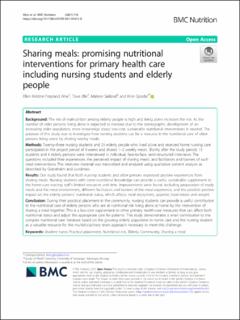| dc.contributor.author | Alne, Ellen Frøyland | |
| dc.contributor.author | Øie, Tove | |
| dc.contributor.author | Søiland, Malene | |
| dc.contributor.author | Gjesdal, Kine | |
| dc.date.accessioned | 2023-02-15T15:46:43Z | |
| dc.date.available | 2023-02-15T15:46:43Z | |
| dc.date.created | 2021-04-19T10:16:44Z | |
| dc.date.issued | 2021 | |
| dc.identifier.citation | Alne, E. K. F., Øie, T., Søiland, M., & Gjesdal, K. (2021). Sharing meals: promising nutritional interventions for primary health care including nursing students and elderly people. BMC nutrition, 7, 1-11. | en_US |
| dc.identifier.issn | 2055-0928 | |
| dc.identifier.uri | https://hdl.handle.net/11250/3051209 | |
| dc.description.abstract | Background
The risk of malnutrition among elderly people is high and living alone increases the risk. As the number of older persons living alone is expected to increase due to the demographic development of an increasing older population, more knowledge about low-cost, sustainable nutritional interventions is needed. The purpose of this study was to investigate how nursing students can be a resource in the nutritional care of older persons living alone by sharing weekly meals.
Methods
Twenty-three nursing students and 23 elderly people who lived alone and received home nursing care participated in the project period of 9 weeks and shared 1–2 weekly meals. Shortly after the study period, 13 students and 4 elderly persons were interviewed in individual, face-to-face, semi-structured interviews. The questions included their experiences, the perceived impact of sharing meals, and facilitators and barriers of such meal interventions. The interview material was transcribed and analyzed using qualitative content analysis as described by Graneheim and Lundman.
Results
Our study found that both nursing students and older persons expressed positive experiences from sharing meals. Nursing students with some nutritional knowledge can provide a useful, sustainable supplement to the home-care nursing staff’s limited resources and time. Improvements were found, including preparation of ready meals and the meal environment, different facilitators and barriers of the meal experience, and the possible positive impact on the elderly persons’ nutritional status, which affects meal enjoyment, appetite, food intake and weight.
Conclusion
During their practical placement in the community, nursing students can provide a useful contribution to the nutritional care of elderly persons who are at nutritional risk living alone at home by the intervention of sharing a meal together. This is a low-cost supplement to other primary health-care measures that can affect both nutritional status and adjust the appropriate care for patients. This study demonstrates a small contribution to the complex nutritional care literature based on the growing elderly population in home care and the nursing student as a valuable resource for the multidisciplinary team approach necessary to meet this challenge. | en_US |
| dc.language.iso | eng | en_US |
| dc.publisher | BMC | en_US |
| dc.rights | Navngivelse 4.0 Internasjonal | * |
| dc.rights.uri | http://creativecommons.org/licenses/by/4.0/deed.no | * |
| dc.title | Sharing meals: promising nutritional interventions for primary health care including nursing students and elderly people | en_US |
| dc.type | Peer reviewed | en_US |
| dc.type | Journal article | en_US |
| dc.description.version | publishedVersion | en_US |
| dc.rights.holder | The authors | en_US |
| dc.subject.nsi | VDP::Medisinske Fag: 700 | en_US |
| dc.source.journal | BMC Nutrition | en_US |
| dc.identifier.doi | 10.1186/s40795-021-00412-8 | |
| dc.identifier.cristin | 1905007 | |
| cristin.ispublished | true | |
| cristin.fulltext | original | |
| cristin.qualitycode | 1 | |

